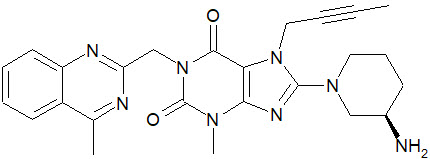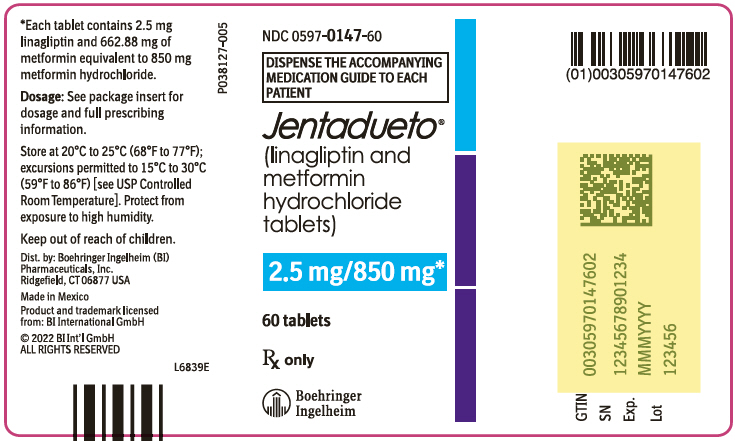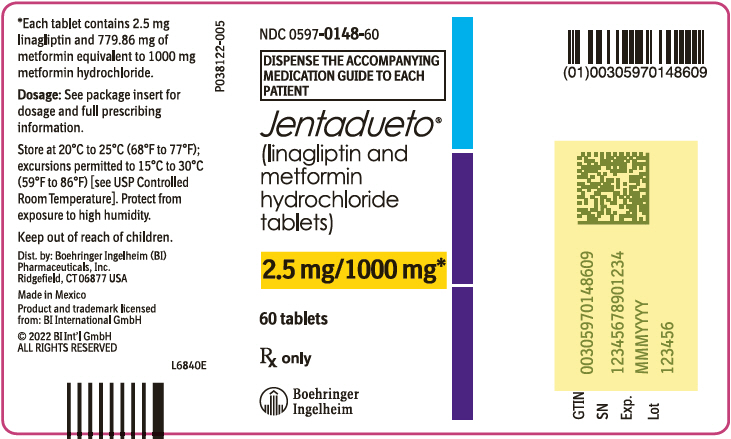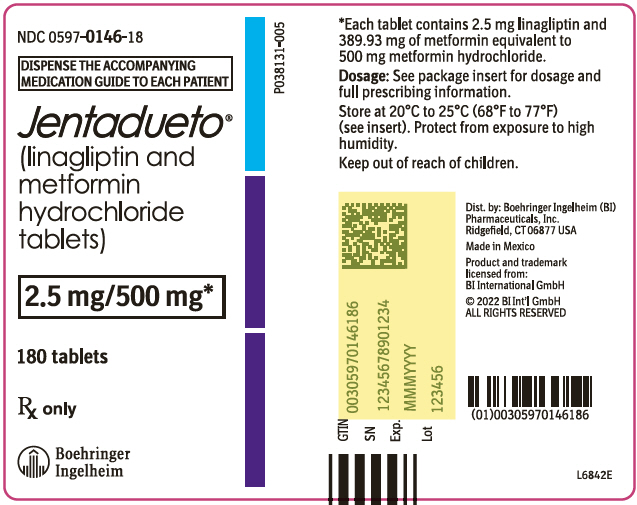Jentadueto
Generic name: linagliptin and metformin
Brand names: Jentadueto, Jentadueto XR
Drug class: Antidiabetic combinations
Medically reviewed by A Ras MD.
What is Jentadueto?
Jentadueto is a prescription medicine that contains 2 diabetes medicines, linagliptin (Tradjenta) and metformin hydrochloride. Jentadueto can be used along with diet and exercise to lower blood sugar in adults with type 2 diabetes. Jentadueto is not for people with type 1 diabetes.
Jentadueto is not for people with diabetic ketoacidosis (increased ketones in the blood or urine). If you have had pancreatitis in the past, it is not known if you have a higher chance of getting pancreatitis while you take Jentadueto.
It is not known if Jentadueto is safe and effective in children under 18 years of age.
Description
JENTADUETO tablets for oral use contain: linagliptin and metformin hydrochloride.
Linagliptin
Linagliptin is an inhibitor of the dipeptidyl peptidase-4 (DPP-4) enzyme.
The chemical name of linagliptin is 1H-Purine-2,6-dione, 8-[(3R)-3-amino-1-piperidinyl]-7-(2-butyn-1-yl)-3,7-dihydro-3-methyl-1-[(4-methyl-2-quinazolinyl)methyl]-
The molecular formula is C25H28N8O2 and the molecular weight is 472.54 g/mol. The structural formula is:

Linagliptin is a white to yellowish, not or only slightly hygroscopic solid substance. It is very slightly soluble in water (0.9 mg/mL). Linagliptin is soluble in methanol (ca. 60 mg/mL), sparingly soluble in ethanol (ca. 10 mg/mL), very slightly soluble in isopropanol (<1 mg/mL), and very slightly soluble in acetone (ca. 1 mg/mL).
Metformin Hydrochloride
Metformin hydrochloride (N,N-dimethylimidodicarbonimidic diamide hydrochloride) is a biguanide. Metformin hydrochloride is a white to off-white crystalline compound with a molecular formula of C4H11N5∙HCl and a molecular weight of 165.63 g/mol. Metformin hydrochloride is freely soluble in water and is practically insoluble in acetone, ether, and chloroform. The pKa of metformin is 12.4. The pH of a 1% aqueous solution of metformin hydrochloride is 6.68. The structural formula is:

JENTADUETO
JENTADUETO is available for oral administration as tablets containing:
- 2.5 mg linagliptin and 389.93 mg of metformin equivalent to 500 mg metformin hydrochloride (JENTADUETO 2.5 mg/500 mg)
- 2.5 mg linagliptin and 662.88 mg of metformin equivalent to 850 mg metformin hydrochloride (JENTADUETO 2.5 mg/850 mg)
- 2.5 mg linagliptin and 779.86 mg of metformin equivalent to 1000 mg metformin hydrochloride (JENTADUETO 2.5 mg/1000 mg)
Each film-coated tablet of JENTADUETO contains the following inactive ingredients: arginine, corn starch, copovidone, colloidal silicon dioxide, magnesium stearate, titanium dioxide, propylene glycol, hypromellose, talc, yellow ferric oxide (2.5 mg/500 mg; 2.5 mg/850 mg) and/or red ferric oxide (2.5 mg/850 mg; 2.5 mg/1000 mg).
Mechanism of Action
JENTADUETO
JENTADUETO contains: linagliptin, a dipeptidyl peptidase-4 (DPP-4) inhibitor, and metformin, a biguanide.
Linagliptin
Linagliptin is an inhibitor of DPP-4, an enzyme that degrades the incretin hormones glucagon-like peptide-1 (GLP-1) and glucose-dependent insulinotropic polypeptide (GIP). Thus, linagliptin increases the concentrations of active incretin hormones, stimulating the release of insulin in a glucose-dependent manner and decreasing the levels of glucagon in the circulation. Both incretin hormones are involved in the physiological regulation of glucose homeostasis. Incretin hormones are secreted at a low basal level throughout the day and levels rise immediately after meal intake. GLP-1 and GIP increase insulin biosynthesis and secretion from pancreatic beta cells in the presence of normal and elevated blood glucose levels. Furthermore, GLP-1 also reduces glucagon secretion from pancreatic alpha cells, resulting in a reduction in hepatic glucose output.
Metformin HCl
Metformin is an antihyperglycemic agent which improves glucose tolerance in patients with type 2 diabetes mellitus, lowering both basal and postprandial plasma glucose. Metformin decreases hepatic glucose production, decreases intestinal absorption of glucose, and improves insulin sensitivity by increasing peripheral glucose uptake and utilization. With metformin therapy, insulin secretion remains unchanged while fasting insulin levels and day-long plasma insulin response may decrease.
What is the most important information I should know about Jentadueto?
Serious side effects can happen in people taking Jentadueto, including:
1. Lactic acidosis. Metformin, one of the medicines in Jentadueto, can cause a rare but serious condition called lactic acidosis (a buildup of an acid in the blood) that can cause death. Lactic acidosis is a medical emergency and must be treated in a hospital.
Call your doctor right away if you have any of the following symptoms, which could be signs of lactic acidosis:
- you feel very weak or tired
- you have unusual (not normal) muscle pain
- you have trouble breathing
- have unexplained stomach or intestinal problems with nausea and vomiting, or diarrhea
- have unusual sleepiness or sleep longer than usual
- feel cold, especially in your arms and legs
- feel dizzy or lightheaded
- have a slow or irregular heartbeat
You have a higher chance of getting lactic acidosis with Jentadueto if you:
- have severe kidney problems.
- have liver problems.
- drink a lot of alcohol (very often or short-term “binge” drinking).
- get dehydrated (lose a large amount of body fluids). This can happen if you are sick with a fever, vomiting, or diarrhea. Dehydration can also happen when you sweat a lot with activity or exercise and do not drink enough fluids.
have certain x-ray tests with injectable dyes or contrast agents. - have surgery or other procedures for which you need to restrict the amount of food and liquid you eat and drink.
- have congestive heart failure.
- have a heart attack, severe infection, or stroke.
- are 65 years of age or older.
Tell your doctor if you have any of the problems in the list above. Tell your doctor that you are taking Jentadueto before you have surgery or x-ray tests. Your doctor may decide to stop your Jentadueto for a while if you have surgery or certain x-ray tests. Jentadueto can have other serious side effects. See “What are the possible side effects of Jentadueto?”
2. Inflammation of the pancreas (pancreatitis) which may be severe and lead to death. Certain medical problems make you more likely to get pancreatitis.
Before you start taking Jentadueto, tell your doctor if you have ever had:
- inflammation of your pancreas (pancreatitis)
- a history of alcoholism
- stones in your gallbladder (gallstones)
- high blood triglyceride levels
Stop taking Jentadueto and call your doctor right away if you have pain in your stomach area (abdomen) that is severe and will not go away. The pain may be felt going from your abdomen through to your back. The pain may happen with or without vomiting. These may be symptoms of pancreatitis.
3. Heart failure. Heart failure means that your heart does not pump blood well enough.
Before you start taking Jentadueto, tell your doctor if you have ever had heart failure or have problems with your kidneys. Contact your doctor right away if you have any of the following symptoms:
- increasing shortness of breath or trouble breathing, especially when you lie down
- swelling or fluid retention, especially in the feet, ankles or legs
- an unusually fast increase in weight
- unusual tiredness
These may be symptoms of heart failure.
Who should not take Jentadueto?
Do not take Jentadueto if you:
- have severe kidney problems
- have a condition called metabolic acidosis or diabetic ketoacidosis (increased ketones in the blood or urine).
- are allergic to linagliptin, metformin, or any of the ingredients in Jentadueto. See the end of this Medication Guide for a complete list of ingredients in Jentadueto.
Symptoms of a serious allergic reaction to Jentadueto may include:- skin rash, itching, flaking or peeling
- raised red patches on your skin (hives)
- swelling of your face, lips, tongue and throat that may cause difficulty in breathing or swallowing
- difficulty with swallowing or breathing
If you have any of these symptoms, stop taking Jentadueto and contact your doctor or go to the nearest hospital emergency room right away.
What should I tell my healthcare provider before taking Jentadueto?
Before you take Jentadueto, tell your doctor about all of your medical conditions, including if you:
- have or have had inflammation of your pancreas (pancreatitis)
- have kidney problems
- have liver problems
- have heart problems, including congestive heart failure
- are 65 years of age or older
- drink alcohol very often, or drink a lot of alcohol in short term “binge” drinking
- are going to get an injection of dye or contrast agents for an x-ray procedure. Jentadueto may need to be stopped for a short time. Talk to your doctor about when you should stop Jentadueto and when you should start Jentadueto again. See “What is the most important information I should know about Jentadueto?”
- have type 1 diabetes. Jentadueto should not be used to treat people with type 1 diabetes.
- have low levels of vitamin B12 in your blood.
- are pregnant or plan to become pregnant. It is not known if Jentadueto will harm your unborn baby. If you are pregnant, talk with your doctor about the best way to control your blood sugar while you are pregnant.
- are breastfeeding or plan to breastfeed. Jentadueto may pass into your breast milk and may harm your baby. Talk with your doctor about the best way to feed your baby if you take Jentadueto.
- are a woman who has not gone through menopause (premenopausal) who does not have periods regularly or at all. Jentadueto can cause the release of an egg from an ovary in a woman (ovulation). This can increase your chance of getting pregnant. Tell your doctor right away if you become pregnant while taking Jentadueto.
Tell your doctor about all the medicines you take, including prescription and over-the-counter medicines, vitamins, and herbal supplements. Jentadueto may affect the way other medicines work, and other medicines may affect how Jentadueto works.
Especially tell your doctor if you take:
- insulin or other medicines that can lower your blood sugar
- diuretics (water pills)
- rifampin (Rifadin, Rimactane, Rifater, Rifamate), an antibiotic that is used to treat tuberculosis
Know the medicines you take. Keep a list of them and show it to your doctor and pharmacist when you get a new medicine.
How should I take Jentadueto?
- Take Jentadueto exactly as your doctor tells you to take it.
- Take Jentadueto 2 times each day with meals. Taking Jentadueto with meals may lower your chance of having an upset stomach.
- If you miss a dose, take it with food as soon as you remember. If you do not remember until it is time for your next dose, skip the missed dose and go back to your regular schedule. Do not take 2 doses of Jentadueto at the same time.
- If you take too much Jentadueto, call your doctor or local poison center or go to the nearest hospital emergency room right away.
- Your doctor may tell you to take Jentadueto along with other diabetes medicines. Low blood sugar can happen more often when Jentadueto is taken with certain other diabetes medicines. See “What are the possible side effects of Jentadueto?”
- Check your blood sugar as your doctor tells you to.
- Your doctor will do blood tests to check how well your kidneys are working before and during your treatment with Jentadueto.
What should I avoid while taking Jentadueto?
Avoid drinking alcohol very often or drinking a lot of alcohol in a short period of time (“binge” drinking). It can increase your chances of getting serious side effects.
What are the possible side effects of Jentadueto?
Jentadueto may cause serious side effects, including:
- See “What is the most important information I should know about Jentadueto?”
- Low blood sugar (hypoglycemia). If you take Jentadueto with another medication that can cause low blood sugar, such as sulfonylurea or insulin, your risk of getting low blood sugar is higher. The dose of your sulfonylurea medicine or insulin may need to be lowered while you take Jentadueto. Signs and symptoms of low blood sugar may include:
- headache
- fast heart beat
- irritability
- dizziness
- drowsiness
- sweating
- hunger
- confusion
- weakness
- feeling jittery
- Allergic (hypersensitivity) reactions. Serious allergic reactions can happen after your first dose or up to 3 months after starting Jentadueto. Symptoms may include:
- swelling of your face, lips, throat, and other areas on your skin
- raised, red areas on your skin (hives)
- difficulty with swallowing or breathing
- skin rash, itching, flaking, or peeling
If you have these symptoms, stop taking Jentadueto and call your doctor or go to the nearest hospital emergency room right away.
- Low vitamin B12 (vitamin B12 deficiency). Using metformin for long periods of time may cause a decrease in the amount of vitamin B12 in your blood, especially if you have had low vitamin B12 blood levels before. Your doctor may do blood tests to check your vitamin B12 levels.
- Joint pain. Some people who take medicines called DPP-4 inhibitors, one of the medicines in Jentadueto, may develop joint pain that can be severe. Call your doctor if you have severe joint pain.
- Skin reaction. Some people who take medicines called DPP-4 inhibitors, one of the medicines in Jentadueto, may develop a skin reaction called bullous pemphigoid that can require treatment in a hospital. Tell your doctor right away if you develop blisters or the breakdown of the outer layer of your skin (erosion). Your doctor may tell you to stop taking Jentadueto.
The most common side effects of Jentadueto include stuffy or runny nose and sore throat and diarrhea.
Tell your doctor if you have any side effects that bother you or that do not go away.
These are not all the possible side effects of Jentadueto. For more information, ask your doctor or pharmacist.
Call your doctor for medical advice about side effects. You may report side effects to FDA at 1-800-FDA-1088.
General information about the safe and effective use of Jentadueto
Medicines are sometimes prescribed for purposes other than those listed in Medication Guides. Do not use Jentadueto for a condition for which it was not prescribed. Do not give Jentadueto to other people, even if they have the same symptoms you have. It may harm them.
This Medication Guide summarizes the most important information about Jentadueto. If you would like more information, talk with your doctor. You can ask your pharmacist or doctor for information about Jentadueto that is written for health professionals.
How should I store Jentadueto?
- Store Jentadueto at room temperature between 68°F and 77°F (20°C and 25°C).
- Keep tablets dry.
Keep Jentadueto and all medicines out of the reach of children.
What are the ingredients in Jentadueto?
Active Ingredients: linagliptin and metformin hydrochloride
Inactive Ingredients: arginine, corn starch, copovidone, colloidal silicon dioxide, magnesium stearate, titanium dioxide, propylene glycol, hypromellose, talc.
2.5 mg/500 mg and 2.5 mg/850 mg tablets also contain yellow ferric oxide.
2.5 mg/850 mg and 2.5 mg/1000 mg tablets also contain red ferric oxide.
Label
PRINCIPAL DISPLAY PANEL – 2.5 MG/850 MG TABLET BOTTLE LABEL
- NDC 0597-0147-60
- DISPENSE THE ACCOMPANYING
MEDICATION GUIDE TO EACH
PATIENT - Jentadueto®
(linagliptin and
metformin
hydrochloride
tablets) - 2.5 mg/850 mg
- 60 tablets
- Rx only
- Boehringer
Ingelheim

PRINCIPAL DISPLAY PANEL – 2.5 MG/1000 MG TABLET BOTTLE LABEL
- NDC 0597-0148-60
- DISPENSE THE ACCOMPANYING
MEDICATION GUIDE TO EACH
PATIENT - Jentadueto®
(linagliptin and
metformin
hydrochloride
tablets) - 2.5 mg/1000 mg
- 60 tablets
- Rx only
- Boehringer
Ingelheim

PRINCIPAL DISPLAY PANEL – 2.5 MG/500 MG TABLET BOTTLE LABEL
- NDC 0597-0146-60
- DISPENSE THE ACCOMPANYING
MEDICATION GUIDE TO EACH
PATIENT - Jentadueto®
(linagliptin and
metformin
hydrochloride
tablets) - 2.5 mg/500 mg
- 60 tablets
- Rx only
- Boehringer
Ingelheim

SRC: NLM .
